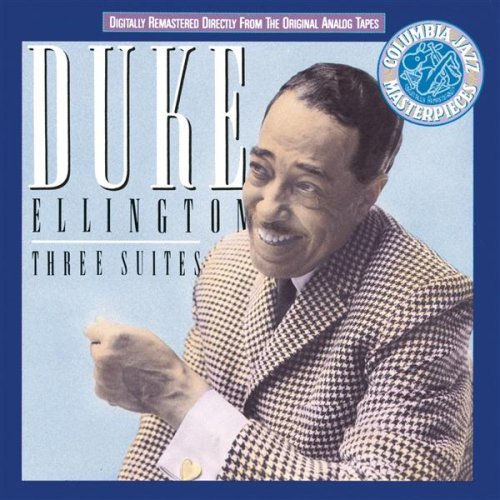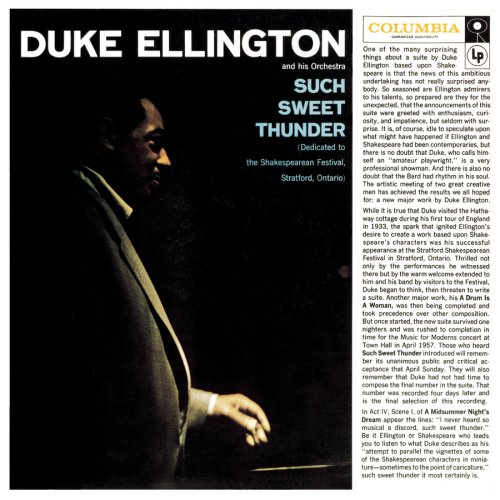Recent listening, current
Archived listening, 2013-2016
Showing posts with label paul gonsalves. Show all posts
Showing posts with label paul gonsalves. Show all posts
Saturday, July 20, 2013
116. Duke Ellington / Such Sweet Thunder (1957)
In 1999, Such Sweet Thunder was released on CD, expanded and including outtakes. It's a fantastic stereo reconstruction of the originally intended program, complete with inter-track studio ambience akin to a concert hall, formerly available only in mono due to a flawed production. The album's original 12 selections are Duke's musical interpretations of various Shakespearean characters. It's another of his concept pieces, a tone parallel like Black, Brown, and Beige. The music is filled with quirky grinners, as in "Lady Mac," where Duke writes new personality into Lady Macbeth. It shows an indulgently swinging streak to the infamous noblewoman, hitherto unseen on stage. And who's to say that's incorrect? It's refreshing. Most notably, the Ellington-Strayhorn team uses soloists in the band to great effect in pieces like "Sonnet for Caesar," the first of four such sonnets on the album that emulate the 14 line poetic form. The soloists actually play the characters with their instruments, so I wonder, wryly, if the union rep had anything to say about that. "Caesar" features Sam Woodyard imparting an appropriately martial atmosphere while Jimmy Hamilton takes the lead (literally) to portray history's great general in a stately and beauteous, but ultimately tragic, melody. The arrangements for other songs continue the trend of band-as-cast in brilliant works like "Up and Down." Here, Puck (played by Clark Terry) quotes mischievously while working the play's couples into increasingly awkward situations. Just three examples, there are nine more to enjoy. It's ambitious, and the CD release is a treasure. It's sound is brilliantly spacious and clear, and we have all the session's complete takes in one place..
Tuesday, July 9, 2013
113. Duke Ellington / Far East Suite (1967)
Last month, I rolled down the windows of my car after working a 12-hour day, twisted the cap off an ice cold Virgil's Orange Cream soda, and enjoyed the drive
home while listening to this record. The Far East Suite is one of Duke's last recorded works, and one whose material might sport the familiar names and faces of orchestras past but its compositions have a unique flavor among others in the Duke canon. It's been on regular rotation at my house since that evening with the soda pop. Between the grooves are yards of punchy counterpoint between reeds and brass, and some of Johnny Hodges' sweetest work on wax ("Isfahan"). And of course we are treated to equally fine work by the likes of Cootie Williams, Cat Anderson, Russell Procope, Harry Carney, et al. The recording is memorable throughout thanks to Duke's direction of the sublimely cohesive band. It is nice to hear Duke melding his percussive piano blues with sophisticated orchestral textures and touches of middle eastern music or orientalism in tracks like "Mount Harissa," "Ad Lib on Nippon" or the opening "Tourist Point of View." I was swept up by the tidal wave of sound, which is what usually happens when I listen to Mr. Ellington.
Labels:
1967,
big band,
bluebird,
cootie williams,
duke ellington,
far east suite,
harry carney,
isfahan,
jazz,
johnny hodges,
orientalism,
paul gonsalves,
piano,
rca,
review,
russell procope
Wednesday, January 23, 2013
12. Duke Ellington / Three Suites
 Here we have interpretations of "Nutcracker" and "Peer Gynt," along with the Duke's own "Suite Thursday." Ellington and Strayhorn have the uncanny arranger's sense for wrapping an original composer's ideas around a new score. Yet this classical-to-jazz amalgam goes beyond Gershwin and is apart from what I consider the third stream. It's a new concept of jazz orchestration that sings to the strengths of the soloists, who do a magnificent job breathing life into the music while avoiding the pitfalls of stereotyping. The score crackles with imagination and the performances are a credit to the band as much as the leader. The notion of Paul Gonsalves blowing a chorus for ballet (listen to the rechristened "Peanut Brittle Brigade") is a tough sell on paper, but to hear it executed with success is an inspired feat of musicianship. Grieg's work is treated with similar respect, retaining atmosphere with reimagined orchestral textures, bursting with big chords and hot solos. I grin hearing the archetypal "Hall of the Mountain King," and I have either Carl Stalling or Nintendo's Tetris to thank for that.
Here we have interpretations of "Nutcracker" and "Peer Gynt," along with the Duke's own "Suite Thursday." Ellington and Strayhorn have the uncanny arranger's sense for wrapping an original composer's ideas around a new score. Yet this classical-to-jazz amalgam goes beyond Gershwin and is apart from what I consider the third stream. It's a new concept of jazz orchestration that sings to the strengths of the soloists, who do a magnificent job breathing life into the music while avoiding the pitfalls of stereotyping. The score crackles with imagination and the performances are a credit to the band as much as the leader. The notion of Paul Gonsalves blowing a chorus for ballet (listen to the rechristened "Peanut Brittle Brigade") is a tough sell on paper, but to hear it executed with success is an inspired feat of musicianship. Grieg's work is treated with similar respect, retaining atmosphere with reimagined orchestral textures, bursting with big chords and hot solos. I grin hearing the archetypal "Hall of the Mountain King," and I have either Carl Stalling or Nintendo's Tetris to thank for that.
Labels:
1960,
billy strayhorn,
carl stalling,
classical,
duke ellington,
george gershwin,
grieg,
jazz,
john steinbeck,
nintendo,
nutcracker,
paul gonsalves,
peer gynt,
review,
tchaikovsky,
tetris,
three suites
Subscribe to:
Posts (Atom)

